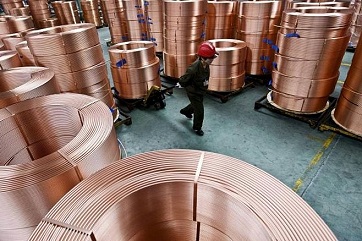China Going Forward?
Yu Yongding
Project Syndicate
China’s per capita income, at $3,800, has now surpassed the threshold for a middle-income country.
But, even as economists and strategists busily extrapolate China’s future growth path to predict when it will catch up to the United States, the mood inside China became somber and subdued in 2010. Indeed, Premier Wen Jiabao sees China’s growth as “unstable, unbalanced, uncoordinated, and ultimately unsustainable.”
Economic growth, of course, has never been linear in any country. Throughout history, there are countless examples of middle-income countries becoming stuck in that category for decades and/or eventually falling back to low-income status. The Nobel laureate economist Michael Spence has pointed out that after WWII, only a handful of countries were able to grow to a fully-industrialized level of development.
China’s progress over the past three decades is a successful variation on the East Asian growth model that stems from the initial conditions bequeathed by a planned socialist economy. That growth model has now almost exhausted its potential. So China has reached a crucial juncture: without painful structural adjustment, its economic-growth momentum can suddenly be lost.
China’s rapid growth has been achieved at extremely high cost. Only future generations will know the true price. The country’s investment rate now stands at more than 50% – a clear reflection of China’s low capital efficiency. There are two worrying aspects of this high rate. First, local governments influence a large proportion of investment decisions. Second, investment in real-estate development accounts for nearly one-quarter of the total.
Some local governments are literally digging holes and then filling them in order to create GDP. As a result, there are simply too many luxurious condominiums, magnificent government office buildings, and soaring skyscrapers. Hotels in China’s provincial cities can make five-star hotels in Western capitals looked shabby.
China has become one of the most polluted countries in the world. Dust and smog choke its cities. All of the country’s major rivers are contaminated. Though progress has been made, deforestation and desertification are still serious and rampant. Drought, floods, and landslides have become commonplace. Relentless extraction is quickly depleting China’s resource deposits.
With China’s trade-to-GDP ratio and exports-to-GDP ratio already exceeding 60% and 30%, respectively, the economy cannot continue to depend on external demand to sustain growth. Unfortunately, with a large export sector that employs scores of millions of workers, this dependence has become structural, which implies that to reduce China’s trade dependency and trade surplus is much more than a matter of adjusting macroeconomic policy.
After decades of rapid expansion, China has become the workshop of the global economy. The problem is that it is no more than a workshop: lack of innovation and creation form the economy’s Achilles’ heel. For example, in volume terms, China now is the largest car producer in the world, churning out 17 million this year. But the share of models developed by Chinese carmakers is negligible.
In an era of rapid technological progress, creativity, and innovation, the global economic landscape can change rapidly. Without a strong capacity for innovation and creativity, even a giant has feet of clay. And when a giant falls, many are hurt.
Indeed, while China’s living standards have risen dramatically over the past 30 years, the gap between rich and poor has widened sharply. Income distribution has skewed in favor of the rich for too long, and the government has failed to provide decent public goods. With the contrast between the opulent lifestyle of the rich and the slow improvement of living conditions for the poor fomenting social tension, a serious backlash is in the making.
If China fails to tackle its structural problems in a timely fashion, growth is unlikely to be sustainable. Any structural adjustment is painful. But the longer the delay, the more painful it will be. China’s strong fiscal position today gives it a window of opportunity. But that window will close fast, because beneficiaries of specific reform policies have morphed into vested interests, which are fighting hard to protect what they have.
What the Chinese public resents most is the collusion between government officials and businesspeople, described by the respected Chinese economist Wu Jianglian as “capitalism of the powerful and rich.” Breaking this unholy alliance will be the big test for China’s leadership in 2011and beyond. Under China’s current institutional arrangements, meritocracy is a prerequisite for good governance. But meritocracy has been eroded by a political culture of sycophancy and cynicism. So once again, the dialectics of economic development has brought political reform back to the fore.
Abroad, China’s rise has caused admiration, envy, suspicion, and even outright hostility in some corners. No matter how often Chinese leaders repudiate any hegemonic ambition, wariness about China’s true intentions will remain. That is understandable: the rise of new powers has always disrupted the established international order. When this new power is a nation of 1.3 billion people living under an alien political system and ideology, its rise is bound to cause even more uneasiness.
Fortunately, because of globalization, China’s rise is in everyone’s interest, as is the rise of other emerging economies. In the coming years, in areas such as climate change, global imbalances, and reform of the international monetary system, China should and will play a more active role as a major global stakeholder. Needless to say, reciprocity will be necessary.
___________________________________________________________________________________
Yu Yongding, currently President of China Society of World Economics, is a former member of the monetary policy committee of the Peoples' Bank of China, and a former Director of the Chinese Academy of Sciences Institute of World Economics and Politics.
___________________________________________________________________________________
Via: DN.no
URL: http://www.a-w-i-p.com/index.php/2011/01/02/china-going-forward

























